Our reactions and responses as leaders set the tone for what is and is not acceptable in the workplace.
You can encourage a culture in your workforce. You can empower individuals to embody that culture. And you can completely undermine and undo all of that work – and the psychological safety underpinning it – if you react negatively in the moment.
To lead with empathy is to foster psychological safety.
"Psychological safety is a belief that one will not be punished or humiliated for speaking up with ideas, questions, concerns or mistakes"
- Amy Edmonson, Organisational Psychologist
The ‘say/do’ gap
The aim for a psychologically safe working environment is not to have a ‘say/do’ gap.
An example of a ‘say/do’ gap would be making reassuring statements at a team meeting, like “it’s ok if you make a mistake,” but in practice when confronted with someone who has made an error, you respond with something like “this will get mentioned in the next team meeting!”.
Before you react to an event, check in with yourself – there’s guidance in our free How-to Guide for ‘Difficult Conversations in Stressful Times‘ here. I also touch upon the ‘say/do’ gap and its impact on trust in the workplace in this video.
Support and challenge
Sometimes we get so wrapped up in being supportive to our workforce, in an attempt to foster psychological safety, that we sacrifice challenge. But challenge is an important part of employee satisfaction. Without challenge, we can quickly become demotivated.
It’s an easy trap to fall into, particularly when times are tough. But try not to forget, in order to get the best out of your workforce, you need to create an environment where employees feel both supported and challenged.
Not only is challenge an important part of motivation, it’s important to ensuring the right culture. As a leader or a manager, it’s as important to call out what is not acceptable as it is to advocate the behaviours that are.
Cultures are cultivated over time. But the impact of changed working patterns might mean that some behaviours have slipped in that you’re not fully comfortable with as a leader or line manager. If these aren’t called out, they can significantly demotivate others.

How to implement in your organisation
If you’re thinking about developing your staff’s behaviours, start by developing a list of scenarios that have the potential to provoke a negative response, and that are likely to occur.
Get either individuals or groups to identify how they could respond that is both supportive and challenging. Group facilitation technique such as ‘Fishbowls’ can be used to practice this further.
As COVID-19 eventually dissipates from our lives, let’s not forget to hold on tight to the holistic understanding that we have started to develop of others – an appreciation of other’s lives outside of work enhances our working relationships and makes for a better working environment, whether you’re a line manager or not.

